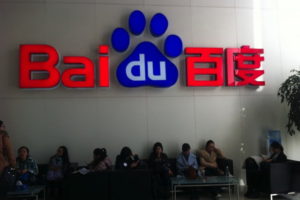19 Oct China’s Baidu, Changan enter the autonomous vehicle fray
Digital Trends, October 14, 2017
Baidu leads autonomous charge in China, with mass-production plans for 2021

The race for truly widespread driverless technology is now seriously burning up the pavement. The international competition is on like never before as China pursues the development of its very own autonomous vehicles. Asian giants like search engine Baidu and manufacturer Changan have joined the race previously spearheaded by American companies like Google and Tesla. Last year, two autonomous Changan cars made a 1,200 mile trip from the southwestern city of Chongqing to Beijing, marking the nation’s first long-distance test of this technology. And now, Baidu has unveiled plans of its own to start mass producing autonomous cars by 2021.
According to Boston Consulting Group projections, China will soon corner more than a quarter of the driverless car market, which is expected to hit 12 million by 2035. Contributing to the popularity of this technology in the eastern nation appears to be the widespread public acceptance of driverless cars. In 2015, a survey by Roland Berger found that 96 percent of Chinese citizens would consider using an autonomous vehicle in day-to-day transportation, whereas only 58 percent of Americans said the same. And given the often gridlocked traffic scene in China and the high prevalence of accidents, some are hopeful that self-driving cars could improve the overall transportation situation.
Baidu’s partnership with Chinese automaker BAIC Group could certainly help with that improvement. The automaker is already one of Baidu’s parters in its Apollo self-driving program, and this open platform will be leveraged to build Level 3 autonomous vehicles (where drivers can safely take their eyes off the road for some time while the car drives itself). Indeed, Level 3 cars are expected to be in production by 2019, and the company is hoping for fully self-driving Level 4 vehicles two years later.
Ultimately, experts say, the goal for China would be to employ driverless cars in taxi and car service businesses. “The real payoff for truly driverless technology will come when cars on the road are no longer owned by people, but are owned by fleet management services,” Bill Russo, managing director of the consultancy firm Gao Feng, told the AFP. “That’s where you want to think about taking the driver out of the equation. Mobility on demand is hugely popular here.”
Citing “very positive feedback” from the Chinese government, Baidu already has routes mapped out for its new public transportation system, and seems confident that autonomous cars and buses will usher in a new era for transportation in a seriously congested traffic situation. And as the company grows its team dedicated to self-driving cars, it looks like the new frontier for vehicular innovation may be slowly moving overseas.
Update: Baidu has plans to start mass producing self-driving cars by 2021.



Sorry, the comment form is closed at this time.